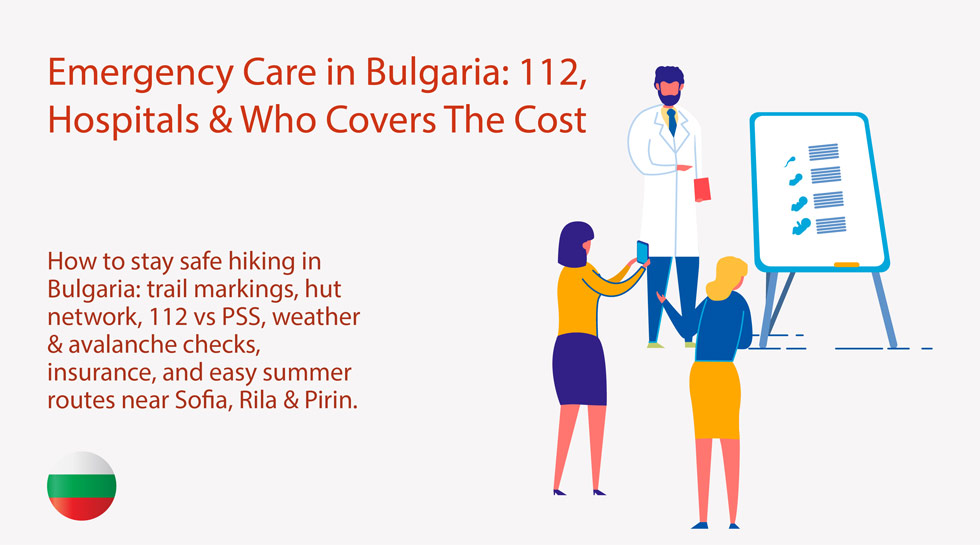Read this first
If someone is seriously ill or injured in Bulgaria, dial 112 (free, 24/7) for immediate assistance. Calls are routed to the National 112 system and dispatch police, fire, or Emergency Medical Services (EMS) ambulances.
Emergency aid is provided regardless of insurance status.
Ongoing non‑emergency hospital care depends on your coverage.
Visitors with an EHIC/GHIC receive state-provided care under the same terms as locals (co-pays may apply). The standard inpatient daily fee is circa EUR 1 for up to 10 days/year. Private clinics usually require up‑front payment.
How do I get help in an emergency?
Dial 112 (no prefix, free from any phone and independent of the provider). It’s Bulgaria’s national emergency number and works EU‑wide.
What languages can I use when calling 112?
In addition to Bulgarian, English, French, and German are generally supported (other languages may be available on a case‑by‑case basis).
Is there an official 112 app?
Yes. The “112 Bulgaria” app lets people with hearing/speech impairments contact 112 via text/chat (Android & iOS). Register inside the app before you need it. Google Play and Apple.
Who runs ambulances in Bulgaria?
Field response and transport are provided by Centers for Emergency Medical Services (CEMS) under the Ministry of Health. They treat at the scene/at home, and during transport, then hand over to hospital emergency departments.
Where will an ambulance take me—public or private?
Usually, to a state/NHIF‑contracted emergency department (public hospital). Hotels/resorts may (rarely, and depending on proximity to public health services) call private services—those typically require upfront payment, and EHIC/GHIC usually won’t apply.
I have an EHIC/GHIC. What do I pay?
With a valid EHIC/GHIC at an NHIF‑contracted provider:
- Ambulance: free, limited to emergencies.
- Hospitalization: State-provided care is covered the same as local care; you pay the inpatient daily fee (currently circa EUR 1/day, up to 10 days/year).
- Outpatient GP visit: typical co‑pay circa EUR 1.50.
I’m uninsured / a non‑EU visitor without an EHIC. Will I be treated? Who pays?
- Emergency aid/stabilization is provided regardless of insurance status.
- Beyond emergency (ongoing diagnostics/treatment/hospital stay): you pay hospital rates or use travel insurance (which can also cover repatriation—EHIC/GHIC do not).
How can I ensure a hospital accepts my EHIC/GHIC?
Use NHIF‑contracted facilities. The EU country page for Bulgaria states coverage is limited to providers contracted with NHIF and links to NHIF resources for provider lists. Ask the receptionist if they are NHIF‑contracted before treatment. Employment, Social Affairs and Inclusion
Who pays & when? (Quick scenarios)
- EU/EEA/CH/UK visitor with EHIC/GHIC, at NHIF‑contracted hospital
- 112/ambulance (emergency): no charge.
- Hospitalization: pay circa EUR 1/day (max 10 days/year) + any standard co‑pays; treatment otherwise covered like a local. Employment, Social Affairs and Inclusion
- Bulgarian resident with a valid NHIF
- 112/ambulance: part of state emergency care, and it is free.
- Hospitalization: pay circa EUR 1/day (max 10 days/year) + standard co‑pays. Euro Health Observatory
- Uninsured / no EHIC
- Emergency stabilization: provided and free.
- Further hospital care: chargeable at hospital rates. Travel insurance is strongly advised for costs and medical evacuation (not covered by EHIC/GHIC). NHIF
- If a Hotel/resort calls a private clinic/ambulance
- Expect up‑front payment; EHIC/GHIC generally not accepted. If you want statutory coverage, ask for transfer to a public/NHIF‑contracted facility.
Why do some sites still say the hospital fee is EUR 3/day?
Because not all pages were updated, the Council of Ministers changed the rate to circa EUR 1/day in April 2025 (maximum 10 days/year). The WHO/European Observatory update confirms the change; some EU pages still show circa 3. Euro Health Observatory
Does EHIC/GHIC replace travel insurance or cover repatriation?
No. The European Commission is clear: EHIC/GHIC is not a substitute for travel insurance and doesn’t cover private care or repatriation. Employment, Social Affairs and Inclusion
Which emergency hospital in Sofia is a common destination?
Depending on the emergency and capacity, ambulances in Sofia transport patients to the nearest appropriate NHIF-contracted emergency department, such as UMBAL “St. Anna” Sofia, UMHALSM “N. I. Pirogov”, Alexandrovska University Hospital, Tsaritsa Yoanna ISUL, and the Military Medical Academy (VMA). Always dial 112 first; the destination is determined by dispatch and clinical need (private clinics may require up‑front payment).
What should I bring to expedite the process?
- Photo ID, EHIC/GHIC (if applicable)
- List of medicines/allergies
- Previous medical history, exams, lab tests, etc.
- Insurance card/policy (if you rely on private travel insurance)
Are there any tips for non-emergency, after-hours care and medications?
Major cities have 24/7 emergency departments and late/24h pharmacies (“денонощна аптека”). For reimbursed medicines, use NHIF‑contracted pharmacies.



